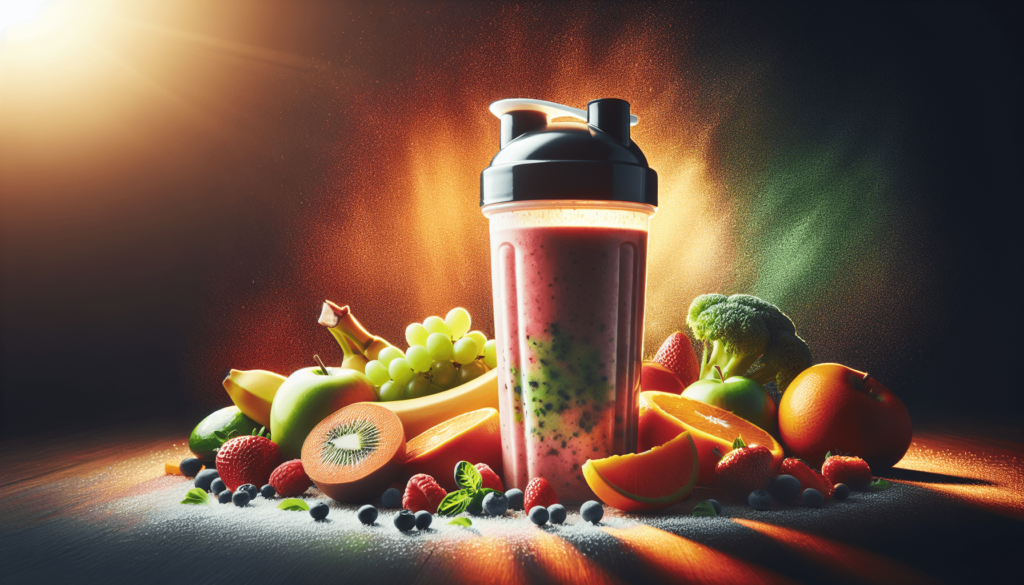Looking to bulk up and build muscle? Look no further! In this article, we will explore the best drinks to help you achieve your muscle-building goals. Sarcopenia, the age-related loss of muscle mass, can be combated with the right fuel for your body. Whether you’re a fitness enthusiast or an older adult hoping to maintain strength, we’ve got you covered. Discover the ultimate beverages that will give you that extra edge in your muscle-building journey. Cheers to a stronger, more resilient you!
Protein Shakes
Protein shakes have become a popular choice among fitness enthusiasts and athletes looking to gain muscle mass. They are a convenient and effective way to boost your protein intake, which is crucial for muscle growth and repair.
Whey Protein
Whey protein is one of the most popular types of protein powder and for good reason. It is a complete protein, meaning it contains all nine essential amino acids that your body needs but cannot produce on its own. Whey protein is quickly absorbed by the body, making it ideal for post-workout recovery. It is also rich in leucine, an amino acid that plays a key role in muscle protein synthesis.
Casein Protein
Casein protein differs from whey protein in terms of digestion rate. While whey protein is quickly absorbed, casein protein is slowly digested, leading to a steady release of amino acids into the bloodstream. This makes it an excellent choice for a nighttime protein shake, as it can provide a sustained release of amino acids while you sleep, promoting muscle repair and growth.
Soy Protein
Soy protein is a plant-based protein option that is derived from soybeans. It is a complete protein and contains all the essential amino acids. Soy protein is an excellent choice for vegetarians and vegans as it provides a comparable amino acid profile to animal-based proteins. It has also been found to have several health benefits, including reducing cholesterol levels and promoting heart health.
Pea Protein
Pea protein is another plant-based protein option that has gained popularity in recent years. It is easily digestible and has a high bioavailability, meaning that your body can efficiently absorb the amino acids it contains. Pea protein is also rich in branched-chain amino acids (BCAAs), which play a vital role in muscle growth and repair.
Hemp Protein
Hemp protein is derived from hemp seeds and is another great plant-based protein option. It is rich in essential fatty acids, including omega-3 and omega-6, which have numerous health benefits. Hemp protein is also easily digestible and contains all the essential amino acids. It is a great choice for those looking for a sustainable and environmentally friendly protein source.
Collagen Protein
Collagen protein is unique in that it primarily contains the amino acids glycine, proline, and hydroxyproline. These amino acids are essential for maintaining healthy connective tissues and promoting joint health. Collagen protein is often used as a supplement to support the health and elasticity of the skin, hair, and nails. While collagen protein may not be as effective for muscle building as other types of protein, it can still be a valuable addition to your overall protein intake.
Creatine Drinks
Creatine is a naturally occurring compound that is found in small amounts in foods like beef and fish. It is also a popular supplement among athletes and bodybuilders looking to increase muscle strength and power. Creatine works by increasing the production of adenosine triphosphate (ATP), which is your body’s primary source of energy during high-intensity exercise.
Creatine Monohydrate
Creatine monohydrate is the most researched and widely used form of creatine. It is highly effective at increasing muscle strength and power, making it a top choice for athletes and bodybuilders. Creatine monohydrate is also cost-effective and readily available, making it an excellent option for those looking to incorporate creatine into their fitness routine.
Creatine Ethyl Ester
Creatine ethyl ester is a form of creatine that is believed to have better absorption rates than creatine monohydrate. However, research on its efficacy is limited, and it may not provide any significant benefits over other forms of creatine.
Creatine Nitrate
Creatine nitrate is a relatively new form of creatine that combines creatine with nitric oxide. Nitric oxide is a vasodilator, meaning it widens your blood vessels and improves blood flow. This may help deliver more creatine and other nutrients to your muscles. However, more research is needed to fully understand the potential benefits of creatine nitrate.
Creatine Hydrochloride
Creatine hydrochloride is another form of creatine that is believed to have better absorption rates than creatine monohydrate. It is also touted as having fewer side effects, such as bloating and stomach cramps. However, research comparing the effectiveness of creatine hydrochloride to other forms of creatine is limited.
Buffered Creatine
Buffered creatine is a form of creatine that is less acidic than other forms, making it easier on the stomach. This may help reduce the side effects often associated with creatine supplementation, such as bloating and gastrointestinal discomfort. Buffered creatine may be a suitable option for those who experience digestive issues with other forms of creatine.

This image is property of pixabay.com.
Branched-Chain Amino Acids (BCAAs)
Branched-chain amino acids (BCAAs) are a group of three essential amino acids: leucine, isoleucine, and valine. These amino acids play a crucial role in muscle protein synthesis, making them essential for muscle growth and recovery.
Leucine
Leucine is perhaps the most important amino acid when it comes to muscle protein synthesis. It activates a signaling pathway in the body that stimulates muscle protein synthesis, leading to increased muscle growth. Consuming leucine-rich foods or supplements can be particularly beneficial during or immediately after exercise.
Isoleucine
Isoleucine is another essential amino acid that works in synergy with leucine to promote muscle protein synthesis. It also plays a role in energy production and glucose metabolism. Like leucine, isoleucine can be consumed through food sources or supplements to support muscle growth and recovery.
Valine
Valine is the third essential amino acid that makes up the BCAAs. It is involved in muscle protein synthesis and energy production. Valine, along with leucine and isoleucine, is important for muscle repair and recovery. Including valine-rich foods or supplements in your diet can help support optimal muscle growth.
Pre-Workout Supplements
Pre-workout supplements are designed to enhance energy, focus, and performance during exercise. They often contain a combination of ingredients that work synergistically to improve athletic performance.
Caffeine
Caffeine is a stimulant that can enhance energy and focus, making it a popular ingredient in pre-workout supplements. It can help combat fatigue and improve endurance, allowing you to push through intense workouts. However, it is essential to note that individual tolerance to caffeine can vary, and excessive consumption can lead to side effects such as jitters and insomnia.
Beta-Alanine
Beta-alanine is an amino acid that combines with histidine to form carnosine, a compound that helps buffer lactic acid buildup in your muscles. By increasing carnosine levels, beta-alanine supplementation can delay muscle fatigue and improve exercise performance, particularly during high-intensity activities.
Citrulline
Citrulline is an amino acid that plays a role in the production of nitric oxide, which helps dilate blood vessels, improving blood flow and nutrient delivery to the muscles. By increasing nitric oxide production, citrulline supplementation may enhance exercise performance, reduce fatigue, and promote better muscle recovery.
L-Arginine
L-arginine is another amino acid that is involved in the production of nitric oxide. Like citrulline, it can help improve blood flow, nutrient delivery, and muscle pump during exercise. However, research on L-arginine supplementation’s effectiveness is mixed, and its potential benefits may vary among individuals.
Beetroot Juice
Beetroot juice is a natural pre-workout supplement that has gained popularity in recent years. It is rich in dietary nitrates, which can increase nitric oxide production and improve blood flow. This can enhance exercise performance, reduce fatigue, and improve endurance. Consuming beetroot juice before a workout may help you power through your training sessions with greater ease.

This image is property of pixabay.com.
Post-Workout Recovery Drinks
Post-workout recovery drinks are specifically formulated to replenish your body’s energy stores and support muscle repair and recovery. They often contain a combination of protein and carbohydrates, along with other ingredients to enhance recovery.
Chocolate Milk
Chocolate milk has gained popularity as a post-workout recovery drink due to its ideal combination of carbohydrates and protein. The carbohydrates help replenish glycogen stores, while the protein supports muscle repair and growth. Additionally, chocolate milk is a great-tasting and readily available option for those looking to refuel after a workout.
Tart Cherry Juice
Tart cherry juice has been hailed for its potential benefits in reducing muscle soreness and inflammation. It contains antioxidants and anti-inflammatory compounds that may promote faster recovery and reduce exercise-induced muscle damage. Consuming tart cherry juice post-workout may help alleviate muscle soreness and support overall recovery.
Coconut Water
Coconut water is a natural and refreshing option for post-workout hydration. It is rich in electrolytes like potassium, which helps replenish lost minerals during exercise. Additionally, coconut water provides carbohydrates for energy and hydration, making it a well-rounded choice for post-workout recovery.
Electrolyte Drinks
Electrolyte drinks, such as sports drinks or rehydration solutions, are specifically formulated to replace lost electrolytes during exercise. Electrolytes are minerals like sodium, potassium, and magnesium that support proper muscle function and hydration. Consuming electrolyte drinks post-workout can help restore electrolyte balance and aid in recovery.
Protein with Carbohydrates
Combining protein with carbohydrates in a post-workout recovery drink can provide the necessary nutrients for muscle repair and glycogen replenishment. The protein helps stimulate muscle protein synthesis, while the carbohydrates support glycogen synthesis. This combination can facilitate faster recovery and promote muscle growth.
Healthy Smoothies
Healthy smoothies are a versatile and delicious way to incorporate nutrient-rich ingredients into your diet. They can be customized to suit your taste preferences and nutritional needs. Here are some popular smoothie options that can support muscle gain and overall health.
Green Smoothies
Green smoothies are made with a base of leafy greens, such as spinach or kale, blended with fruits, vegetables, and liquid. They are rich in vitamins, minerals, and antioxidants, making them an excellent choice for overall health and muscle recovery. Green smoothies can be customized with protein powder, nut butter, or seeds to increase their protein content.
Banana and Almond Butter Smoothie
Banana and almond butter smoothies are a great option for a quick and satisfying post-workout snack. Bananas provide fast-digesting carbohydrates to replenish glycogen stores, while almond butter adds healthy fats and protein. This combination can help support muscle recovery and provide sustained energy.
Blueberry and Spinach Smoothie
Blueberry and spinach smoothies are packed with antioxidants, fiber, and essential vitamins and minerals. Blueberries are rich in antioxidants that can help reduce muscle damage caused by exercise. Spinach is loaded with vitamins and minerals like iron and magnesium, which are crucial for muscle function and recovery.
Avocado and Kale Smoothie
Avocado and kale smoothies offer a creamy and nutrient-dense option for muscle recovery. Avocado provides healthy fats, fiber, and vitamins, while kale adds a dose of antioxidants and essential nutrients. Including protein powder or Greek yogurt in this smoothie can further enhance its muscle-building properties.
Protein-Packed Fruit Smoothie
A protein-packed fruit smoothie is an excellent choice for post-workout recovery. Blend your favorite fruits, such as berries, with a high-quality protein powder and liquid of your choice. This will provide a balance of carbohydrates and protein to support muscle repair and glycogen replenishment.

This image is property of pixabay.com.
Hydration Drinks
Staying hydrated is crucial for overall health and optimal exercise performance. Hydration drinks can help replenish lost fluids and electrolytes, supporting proper hydration levels during and after exercise.
Water
Water is the most basic and essential hydration drink. It is calorie-free and helps maintain fluid balance in the body. Drinking enough water throughout the day is crucial for optimal hydration and overall health.
Sports Drinks
Sports drinks are designed to provide a source of carbohydrates and electrolytes during intense exercise. They can help replenish lost fluids and electrolytes, especially during prolonged or high-intensity workouts. However, sports drinks are typically high in sugar, so they should be consumed in moderation.
Coconut Water
Coconut water is a natural and hydrating beverage that contains electrolytes like potassium and magnesium. It can provide a refreshing alternative to plain water and help replenish lost minerals during exercise. Coconut water is lower in sugar than many sports drinks, making it a healthier choice for hydration.
Fruit-Infused Water
Fruit-infused water adds a burst of flavor to plain water, making it more enticing to drink. You can infuse water with fruits like citrus, berries, or herbs like mint or basil. Fruit-infused water provides a subtle hint of flavor without adding excessive calories or sugar.
Electrolyte-Enhanced Water
Electrolyte-enhanced water is specially formulated to contain added electrolytes like sodium and potassium. These electrolytes help replenish lost minerals during exercise and support proper hydration. Electrolyte-enhanced water can be a convenient option for those who prefer flavored beverages but want to avoid excess sugars found in sports drinks.
Milk
Milk is a nutrient-rich beverage that can be a valuable addition to a muscle-building diet. It contains a balance of carbohydrates, protein, and fats, along with various vitamins and minerals.
Skim Milk
Skim milk, also known as non-fat milk, is low in calories and fat but still provides a good amount of protein. It can be an excellent option for those looking to limit their calorie intake while still getting a good dose of protein and essential nutrients.
Low-Fat Milk
Low-fat milk contains a slightly higher fat content than skim milk but is still lower in fat than whole milk. It provides a good balance of protein, carbohydrates, and fats, making it a versatile option for muscle gain and overall health.
Chocolate Milk
Chocolate milk has gained popularity as a post-workout recovery drink due to its ideal combination of carbohydrates and protein. The added chocolate flavor makes it more enjoyable while providing essential nutrients for muscle repair and glycogen replenishment.
Almond Milk
Almond milk is a plant-based alternative to dairy milk that is naturally low in calories and fat. While it is not as high in protein as cow’s milk, it can still be a suitable choice for those who prefer a dairy-free option. Almond milk is often fortified with calcium and vitamin D to mimic the nutrient content of cow’s milk.
Soy Milk
Soy milk is another plant-based milk alternative that is rich in protein. It contains all the essential amino acids, making it a complete protein source. Soy milk is also fortified with calcium and vitamin D, making it a comparable option to cow’s milk in terms of nutrient content.

Juices
Juices can be a delicious and refreshing way to hydrate and provide essential vitamins and minerals. However, it’s important to choose juices that are not laden with added sugars and to consume them in moderation as part of a well-balanced diet.
Orange Juice
Orange juice is a classic breakfast staple that is rich in vitamin C and other essential nutrients. It can provide a natural source of carbohydrates for energy and hydration. However, be mindful of portion sizes and opt for 100% orange juice without added sugars.
Pineapple Juice
Pineapple juice is a tropical and tangy beverage that is naturally high in vitamins and minerals. It contains bromelain, an enzyme that can aid in digestion and reduce inflammation. Pineapple juice can be a refreshing option for rehydration and can be enjoyed on its own or mixed with other juices.
Apple Juice
Apple juice is a popular choice among juice enthusiasts and is known for its crisp and sweet flavor. It is a good source of vitamin C and other antioxidants. Apple juice can be consumed as a standalone drink or used as a base for homemade smoothies.
Grape Juice
Grape juice is a flavorful and naturally sweet option that is rich in antioxidants like resveratrol. This compound has been shown to have various health benefits, including reducing inflammation and improving heart health. Grape juice can be enjoyed on its own or mixed with other juices for a unique and tasty combination.
Watermelon Juice
Watermelon juice is a refreshing and hydrating choice, especially during hot summer months. It has a high water content, making it an excellent option for rehydration. Watermelon juice is also low in calories and provides essential vitamins and minerals.
Herbal Teas
Herbal teas are a popular choice for those looking to hydrate with caffeine-free beverages. They can provide a calming and soothing effect while offering various health benefits.
Green Tea
Green tea is a well-known herbal tea that is rich in antioxidants and catechins. These compounds have been shown to have numerous health benefits, including boosting metabolism, aiding in weight loss, and reducing the risk of chronic diseases. Green tea can be consumed hot or cold and can be flavored with lemon or honey for added taste.
Peppermint Tea
Peppermint tea is known for its refreshing and soothing properties. It can help alleviate digestive issues, such as bloating and indigestion. Peppermint tea can be enjoyed hot or cold and is a great option for relaxation and digestion support.
Ginger Tea
Ginger tea is made from the root of the ginger plant and has been used for centuries for its medicinal properties. It can aid in digestion, reduce nausea, and provide relief from inflammation and pain. Ginger tea can be enjoyed on its own or mixed with other herbal teas for a unique flavor profile.
Dandelion Tea
Dandelion tea is made from the roots or leaves of the dandelion plant and is known for its diuretic properties. It can help promote detoxification, support liver health, and aid in digestion. Dandelion tea has a slightly bitter taste but can be sweetened with honey or other natural sweeteners.
Hibiscus Tea
Hibiscus tea is a vibrant and tangy herbal tea that is enjoyed for its refreshing taste and health benefits. It is rich in antioxidants and can help reduce blood pressure and improve heart health. Hibiscus tea can be enjoyed hot or cold and can be sweetened with natural sweeteners like honey or stevia.
In conclusion, there are numerous options when it comes to choosing what to drink to gain muscle. Protein shakes, such as whey protein or plant-based options like soy or pea protein, can help provide the necessary amino acids for muscle growth and repair. Creatine drinks, including monohydrate or hydrochloride, can enhance strength and power during workouts. Branched-chain amino acids (BCAAs), such as leucine, isoleucine, and valine, are essential for muscle protein synthesis. Pre-workout supplements like caffeine or citrulline can enhance energy and performance. Post-workout recovery drinks like chocolate milk or tart cherry juice can replenish glycogen stores and support muscle repair. Healthy smoothies, hydration drinks, milk and dairy alternatives, juices, and herbal teas all provide unique nutritional benefits and can be incorporated into a well-balanced diet to support muscle gain and overall health.



